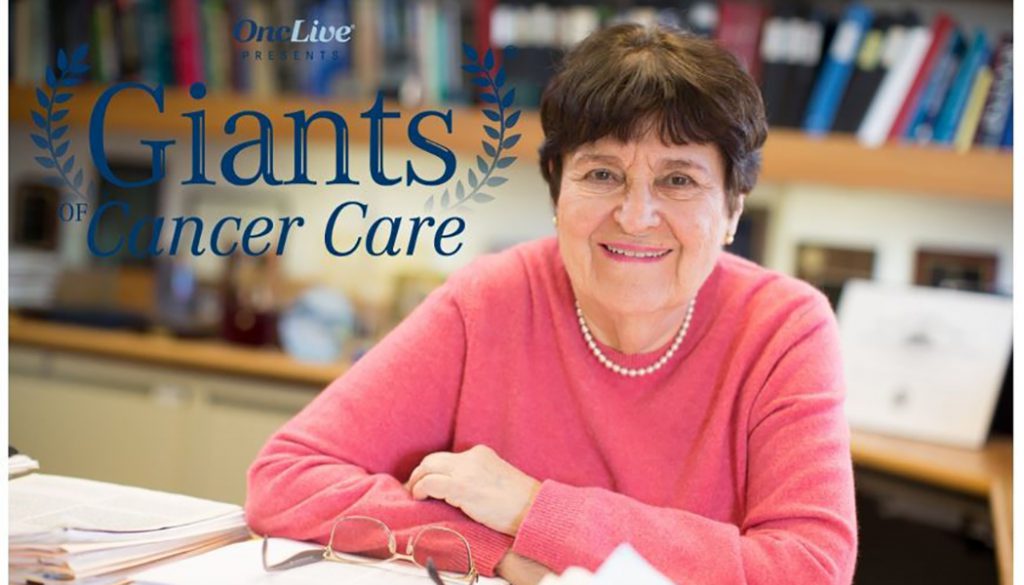NFCR Fellow Susan Band Horwitz Named Giant of Cancer Care
FOR IMMEDIATE RELEASE:
June 3, 2019
CONTACT:
National Foundation for Cancer Research
Bradley Gillenwater, Senior Director for Global Program Management
E-mail: bgillenwater@nfcr.org / Phone: 301-961-9161
Becomes the Fifth National Foundation for Cancer Research Scientist to Receive the Honor
ROCKVILLE, MD – National Foundation for Cancer Research (NFCR) Fellow Susan Band Horwitz, Ph.D., was recognized last Thursday evening as a Giant of Cancer Care in an event at the Adler Planetarium in Chicago. She was accompanied by 14 other highly respected healthcare professionals who are advancing the field of oncology by their contributions in research and clinical practice in receiving the honor.
Doctor Horwitz joins four other current and former NFCR-funded scientists—the late Waun Ki Hong, M.D., F.A.C.P., D.M.Sc. (Hon.) (inducted in 2018), W.K. Alfred Yung, M.D. (2018), Robert Bast, M.D. (2015), and Daniel Von Hoff, M.D. (2016)—as Giants of Cancer Care. Other oncology research luminaries, including James Allison, Ph.D. (2014), winner of NFCR’s 2014 Szent-Györgyi Prize for Progress in Cancer Research, too are members of this exclusive club, comprised of fewer than 100 of the world’s cancer-battling elite.
“Congratulations to Susan for this wonderful recognition,” states NFCR President and CEO Sujuan Ba, Ph.D. “The National Foundation for Cancer Research is proud of you and your vast contributions to cancer drug development and overcoming drug resistance. Our organization is honored to have been supporting your work for the past two decades.”
A distinguished professor and Rose C. Falkenstein Chair in Cancer Research at the Albert Einstein College of Medicine in New York, Dr. Horwitz elucidated the mechanism of action of Taxol®, a natural product obtained from the yew tree. Specifically, she discovered and proved that the molecule, whose chemical name is paclitaxel, binds to microtubules in cells, stabilizing them, thereby leading to cell cycle arrest and subsequent tumor cell death. This body of work enabled the successful translation of the drug into the clinic, and it is now one of the most frequently prescribed medications in the world for the treatment of ovarian, breast and lung cancers.
Dr. Horwitz’s current NFCR-funded work includes research into which tubulin proteins in the microtubules may have a role in resistance to Taxol, as well as efforts that may help predict which patients would be more likely to respond well to the treatment. Also, in collaboration with another NFCR fellow, the University of Pennsylvania’s Amos B. Smith III, Ph.D., she is developing analogues of another natural product, discodermolide, a microtubule stabilizing agent which exhibits low toxicity. These may in the future serve as additional cancer treatments.
Presented since 2013 by OncLive®, a respected cancer communications website, Giants of Cancer Care awards celebrate the achievements of leading researchers and educators whose discoveries have helped propel the field of oncology forward and established the building blocks for future advances. In 2019, a selection committee of over 100 eminent oncologists, researchers and clinicians chose honorees from several different tumor type and specialty categories.
About the National Foundation for Cancer Research
The National Foundation for Cancer Research (NFCR) is a 501(c)(3) non-profit organization that provides scientists in the lab the funding they need to make and apply game-changing discoveries in cancer treatments, detection, prevention and, ultimately, a cure. It has distinguished itself in the cancer sector by emphasizing long-term, transformative research often overlooked by other major funding sources. With the help of more than 5.3 million individual donors over the last 46 years, NFCR has delivered more than $380 million in funding to public education and cancer research leading to several important, life-saving discoveries. For more information, visit http://www.nfcr.org.
A high-resolution version of the included image is available upon request (sources: Albert Einstein College of Medicine and OncLive®).
###












